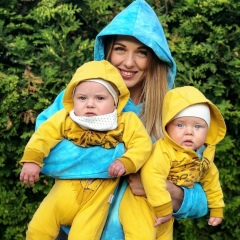Провела тёплый вечер с бабушкой. Пока я доедала оказики, она вспоминала, как в детстве славили Рождество у них - бабушка росла в селе Большая Соснова под Пермью. 7 января рано утром, в 6-7 часов по селу ходили дети с мешками через плечо и пели: "Рождество Твое, Христе Боже наш,..." Детям подавали кусок хлеба или шаньгу. Это был 1948 год, сладостей и ничего такого особенного в домах не было. Но детвора пела не ради подаяния, был весел сам процесс беготни от дома к дому и хоровое пение. Прям как нам в фильмах показывают католическое Рождество.
Бабушка, кстати, не ходила, мама её не отпускала славить Рождество, хоть и была верующей. Отец бабушки был партийным, и вообще семья по меркам села считалась современной - старшая из сестёр бабушки была образованной, уже работала учителем, так что не до религиозных праздников.
------
Славите, славите,
Вы меня не знаете,
Я наелся творогУ,
Больше славить не могу!
- пела девочка Фая, подружка моей бабушки, у которой папа работал на Маслозаводе, где изготовляли творог в том числе. Бедные дети думали, что дома у Фаи и впрямь творога просто завались, по блату. Но это, конечно, расходилось с действительностью))
Бабушка, кстати, не ходила, мама её не отпускала славить Рождество, хоть и была верующей. Отец бабушки был партийным, и вообще семья по меркам села считалась современной - старшая из сестёр бабушки была образованной, уже работала учителем, так что не до религиозных праздников.
------
Славите, славите,
Вы меня не знаете,
Я наелся творогУ,
Больше славить не могу!
- пела девочка Фая, подружка моей бабушки, у которой папа работал на Маслозаводе, где изготовляли творог в том числе. Бедные дети думали, что дома у Фаи и впрямь творога просто завались, по блату. Но это, конечно, расходилось с действительностью))
I spent a warm evening with my grandmother. While I was finishing the service, she recalled how they celebrated Christmas with them as a child - my grandmother grew up in the village of Bolshaya Sosnova near Perm. On January 7, early in the morning, at 6-7 o'clock, children walked around the village with sacks over their shoulders and sang: "Your Christmas, Christ our God ..." Children were served a piece of bread or shangu. It was 1948, there were no sweets and nothing special in the houses. But the children sang not for alms, the process of running from house to house and the choral singing was cheerful. Just like we are shown in the movies Catholic Christmas.
By the way, my grandmother did not go, her mother did not let her go to praise Christmas, although she was a believer. The grandmother's father was a party member, and in general the family was considered modern by the standards of the village - the eldest of the grandmother's sisters was educated, already worked as a teacher, so there was no time for religious holidays.
------
Praise, praise,
You do not know me,
I ate cottage cheese
I can't praise anymore!
- sang the girl Faya, a friend of my grandmother, whose dad worked at the Butter Plant, where they made cottage cheese, too. Poor children thought that Faya's house was really just heaps of cottage cheese, by pull. But this, of course, was at odds with reality))
By the way, my grandmother did not go, her mother did not let her go to praise Christmas, although she was a believer. The grandmother's father was a party member, and in general the family was considered modern by the standards of the village - the eldest of the grandmother's sisters was educated, already worked as a teacher, so there was no time for religious holidays.
------
Praise, praise,
You do not know me,
I ate cottage cheese
I can't praise anymore!
- sang the girl Faya, a friend of my grandmother, whose dad worked at the Butter Plant, where they made cottage cheese, too. Poor children thought that Faya's house was really just heaps of cottage cheese, by pull. But this, of course, was at odds with reality))

У записи 27 лайков,
0 репостов,
285 просмотров.
0 репостов,
285 просмотров.
Эту запись оставил(а) на своей стене Настя Шепенко



![Арина Флягина [FAA] Арина Флягина [FAA]](https://sun9-67.vkuserphoto.ru/s/v1/ig2/YgUInStE83mg8J9RKw6VoH-SLsHghvepZzKYpWleZzQf_EmXkje-Aka3tfhMLeNkLrIF354pzSSuXt14a2wX4anL.jpg?quality=95&crop=172,21,547,547&as=32x32,48x48,72x72,108x108,160x160,240x240,360x360,480x480,540x540&ava=1&cs=200x200)









































